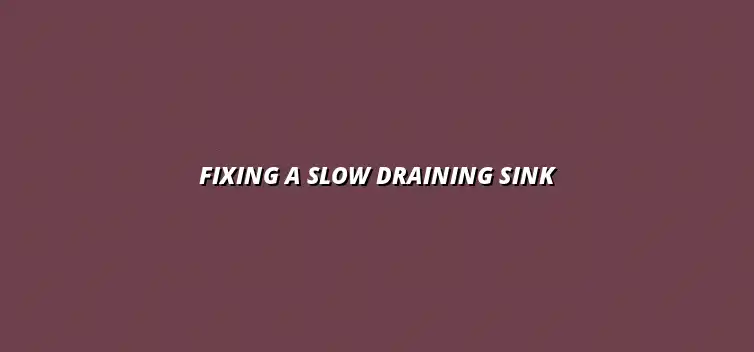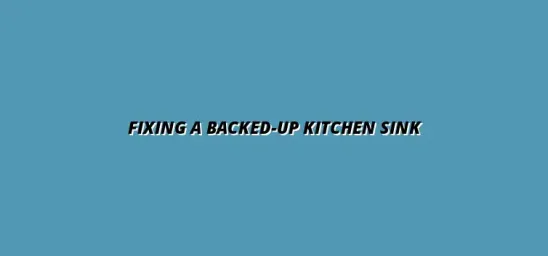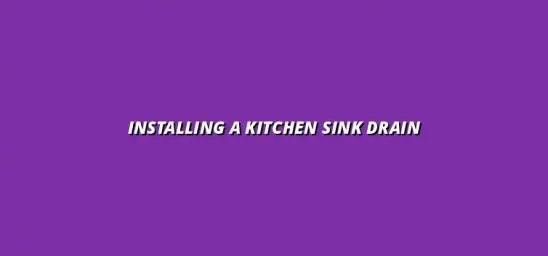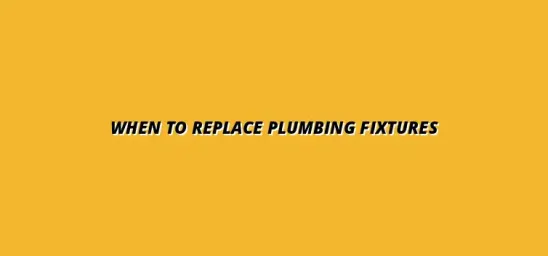
Fixing a Slow Draining Sink
Understanding the Problem of a Slow Draining Kitchen Sink
Experiencing a slow draining kitchen sink can be frustrating. It's one of those household annoyances that can disrupt daily routines. Understanding the underlying problems is the first step to resolving this issue effectively!
Whether it's a minor inconvenience or a sign of something more serious, knowing how to identify the symptoms of a slow drain is essential. By addressing these symptoms early, you can prevent more significant plumbing problems down the line. For example, learning how to unclog your sink with ease can save you time and potential costly repairs.
Identifying Symptoms of a Slow Drain
Recognizing the signs of a slow drain can save you time and stress. Here are some common symptoms you should watch for:
- Water pooling in the sink instead of draining.
- Sudden gurgling sounds when the water is running.
- Draining takes significantly longer than usual.
If you notice these symptoms, it’s a good idea to take action. Ignoring them may lead to further blockages or even damage to your plumbing system!
Common Signs of Drainage Issues
There are several specific indicators that your kitchen sink might be facing drainage issues. Here’s a list of the most common signs:
- Foul odors emanating from the sink.
- Water backing up into other plumbing fixtures.
- Visible debris or buildup in the drain.
Being aware of these signs can help you act quickly and avoid more complicated problems. If you see any of these signs, consider checking your drains as soon as possible. For tips on eliminating kitchen sink odors, check out this helpful guide.
When to Seek Professional Help
Sometimes, a slow drain can indicate a more severe issue that requires professional intervention. It’s essential to know when it's time to call in the experts!
If you experience stubborn clogs that won't budge, or if multiple drains in your home are affected, you should seek help. Consider contacting a local plumber, such as a plumber in Billesley, Birmingham, for assistance. Professional plumbers have the tools and knowledge to handle these more complicated situations.
Causes Behind Slow Kitchen Sink Drainage
Understanding the common causes of slow kitchen sink drainage can help you tackle the issue effectively. From clogs to pipe problems, identifying the root cause will guide you in finding a solution!
By knowing what to look for, you can make informed decisions about whether to try fixing it yourself or call a plumber. Let’s explore these causes in detail.
Clogs and Blockages: The Main Culprit
Clogs are often the main reason for a slow kitchen sink drain. They can form gradually and may not be immediately obvious. Here are the most common types:
- Food waste that builds up over time.
- Grease and oil that solidify in the pipes.
- Hair and soap scum that accumulate in the drain.
Each of these blockages can significantly slow down drainage. Understanding what causes them helps you prevent future clogs from forming! Learning how to prevent kitchen sink blockages easily is key to maintaining a smoothly functioning sink.
Types of Clogs: From Food Waste to Grease Buildup
It's important to recognize the various types of clogs that can occur in your kitchen sink. Here’s a closer look:
- Food Waste: Bigger pieces of food can get stuck in your pipes.
- Grease Buildup: Cooking oils can congeal and create thick layers.
- Foreign Objects: Small items can accidentally fall into the drain.
Knowing these types can help you avoid putting certain items down your sink, thereby reducing the chances of clogs!
Identifying the Location of the Clog
Locating the exact spot of a clog can save time and effort. Here’s what you can do:
- Check the sink trap under your sink.
- Look for signs of water pooling around the base of the sink.
- Run water in other sinks to see if they are affected.
Identifying the location of the clog allows you to address it more effectively, either through DIY methods or by calling a professional! For helpful tips on unclogging your kitchen drain, you can check out this guide on unclogging kitchen drain pipe tips.
Pipe Issues and Their Impact on Drainage
Sometimes, slow drainage is not just about clogs but about the pipes themselves. Understanding pipe issues can give you insight into the problem.
If pipes are misaligned or damaged, they may restrict water flow. This can lead to frustrating drainage problems that require attention!
Understanding Pipe Angles and Slopes
The design of your plumbing plays a significant role in how well water drains from your sink. Here are some factors to consider:
- Pipes should ideally slope downward to facilitate drainage.
- Incorrect angles can cause water to pool.
- Long horizontal runs can slow down drainage as well.
Being aware of these factors can help you troubleshoot slow drainage. If the angles are incorrect, a plumber may need to adjust them for optimal flow!
Effects of Pipe Damage and Corrosion
Pipe damage can lead to serious drainage issues. Here’s what you should know:
- Cracks and leaks can allow debris to enter the pipes.
- Corrosion can narrow the pipe diameter, restricting flow.
- Older pipes may require replacement to restore proper drainage.
Being proactive about pipe maintenance can prevent slow drainage and costly repairs in the future!
Ventilation Problems Affecting Drainage
Did you know that ventilation can impact your sink’s drainage performance? Proper air flow is crucial for a functional drainage system!
When air cannot flow freely through the plumbing, it can cause slow drainage and even backups. Let’s delve deeper into this issue.
How Air Vents Influence Drainage Efficiency
Air vents play a vital role in keeping the drain functioning smoothly. Here’s why they matter:
- They prevent suction that can slow down drainage.
- They help maintain proper pressure in the drainage system.
- Blocked vents can lead to gurgling sounds and slow drains.
Ensuring your ventilation is clear is just as important as maintaining the pipes themselves!
Identifying Signs of Venting Issues
Recognizing signs of venting issues can help you act before they turn into bigger problems. Watch out for:
- Gurgling sounds when using the sink.
- Slow drainage across multiple fixtures.
- Unpleasant odors coming from drains.
If you notice these signs, it may be time to check your air vents and ensure they are functioning correctly!
Understanding When to Call in a Professional
Dealing with a slow-draining kitchen sink can be frustrating! Sometimes, it’s easy to fix, but other times, you might need to call in a professional. It's crucial to assess the situation carefully to decide if you can tackle it or if a plumber is necessary. For simple DIY solutions to prevent clogs, you might find this article helpful: DIY tips to prevent sink clogs.
When you notice persistent issues, it’s time to evaluate the severity. Factors like water backing up, foul smells, or gurgling sounds can all signal that professional intervention might be needed. Let’s explore how to recognize when it’s time to pick up the phone!
Assessing the Severity of the Drainage Issue
Before reaching out for help, consider the signs indicating that a professional repair is essential. If you notice multiple drains in your home are slow, it could be a bigger problem. Here are some key signs to watch for:
- Water backing up into the sink or other drains
- Persistent foul odors coming from the drain
- Gurgling noises when using the sink or other fixtures
- Repeated clogs that don’t respond to DIY solutions
If you identify one or more of these symptoms, it may be time to call a plumber. But don’t forget to consider the cost of hiring a professional. Understanding these costs can help you budget effectively for necessary repairs. Sometimes, fixing a clogged kitchen sink yourself is possible. See this guide on fixing a clogged kitchen sink for helpful tips.
Cost Considerations for Hiring a Plumber
Hiring a plumber can be a significant expense, so it’s essential to know what to expect. Costs can vary based on factors like your location, the complexity of the issue, and the plumber’s experience. Here are a few cost factors to keep in mind:
- Hourly rate of the plumber
- Cost of any parts needed for repairs
- Minimum service fees
- Emergency service charges if needed
By knowing these costs upfront, you can make an informed decision when hiring a professional. Don't hesitate to ask for a detailed estimate before work begins!
Choosing the Right Plumbing Service
Once you’ve decided to hire a plumber, the next step is to find the right service for your needs. Not all plumbing services are created equal, so it’s essential to do your homework!
- Reputation and reviews from previous customers
- Experience and expertise in dealing with drainage issues
- Availability for urgent repairs
- Transparent pricing and clear estimates
Taking the time to research plumbers will lead to better service and satisfaction. It’s also wise to ask the right questions before making your choice!
Questions to Ask Before Hiring a Plumbing Professional
When you find a potential plumbing service, asking the right questions can help ensure you are making a good decision. Here’s a list of useful questions to ask your potential plumber:
- What is your experience with kitchen sink drainage issues?
- Are you licensed and insured?
- Can you provide references from past customers?
- What is your estimated timeline for repairs?
These questions will give you a better understanding of their capabilities and how they approach problems. A good plumber will be open and transparent with their answers!
Long-term Solutions and Maintenance Tips
Understanding how to prevent future drainage issues can save you time and hassle. Investing in long-term solutions can help keep your kitchen sink running smoothly. Let’s take a look at some practical options!
Investing in Drainage System Upgrades
Sometimes, the best solution for slow drains is to upgrade your existing drainage system. Modern solutions can improve efficiency and prevent future problems. Here are some modern drainage solutions to consider:
- Installing high-quality drain pipes
- Using advanced drainage systems designed to minimize clogs
- Implementing grease traps for kitchens
These upgrades may require an initial investment, but they can save you money and frustration over time. Well-maintained systems are less likely to develop issues!
Understanding Modern Drainage Solutions
When investing in upgrades, it’s essential to understand the benefits of various modern drainage solutions. They are designed to enhance performance and prevent clogs effectively. Key benefits include:
- Improved water flow and drainage efficiency
- Reduced risk of future blockages
- Lower maintenance costs over time
By choosing wisely, you can make a decision that benefits your kitchen in the long run!
FAQs Related to Slow Draining Kitchen Sinks
It's common to have questions about slow-draining kitchen sinks. Here are answers to some frequently asked questions:
What are the most common causes of slow draining sinks?
The most common causes include clogs from food particles, grease buildup, or even soap residue. Additionally, pipe issues or venting problems can contribute to slow drainage.
How often should I clean my kitchen sink drain?
I recommend cleaning your kitchen sink drain at least once a month to prevent buildup. Regular maintenance keeps your sink running smoothly and can help you avoid larger issues later.
Final Thoughts on Kitchen Sink Drain Maintenance
Maintaining your kitchen sink drain is crucial for optimal performance. A proactive approach can save you from future headaches and costly repairs. Let's recap the key takeaways for keeping your drain in great shape!
Recap of Key Takeaways to Ensure Optimal Drain Performance
Regular maintenance and prompt action can make all the difference. Here’s a quick list of strategies to ensure your kitchen sink drain remains in excellent condition:
- Perform monthly cleanings with natural remedies
- Be mindful of what goes down your drain
- Address issues promptly before they worsen
By following these tips, you can maintain a hassle-free kitchen experience!
Encouraging Proactive Maintenance Practices
Taking proactive steps helps prevent problems before they arise. Implementing simple practices can ensure your kitchen remains clean and functional. Remember:
- Keep a strainer in your sink to catch food particles
- Run hot water regularly to dissolve grease
- Schedule professional cleanings when needed
With a little effort, you can keep your kitchen sink drain in top shape!
Emphasizing the Importance of Timely Action on Drain Issues
Finally, don’t ignore signs of drainage issues—acting quickly can save you time and money. By staying vigilant and following maintenance practices, you can ensure a smooth-running kitchen sink for years to come. Now that you know what to look for and what to do, you can tackle any drain problem with confidence!





Fixing a Backed-Up Kitchen Sink
Prepare Your Plumbing for Weather
Installing a Kitchen Sink Drain
When to Replace Plumbing Fixtures
Fixing a Jammed Garbage Disposal